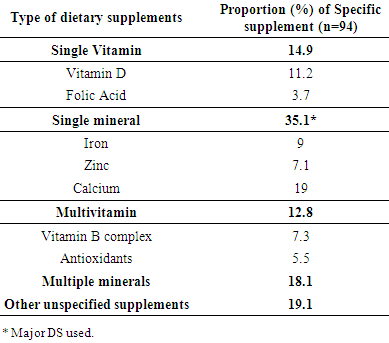-
Paper Information
- Paper Submission
-
Journal Information
- About This Journal
- Editorial Board
- Current Issue
- Archive
- Author Guidelines
- Contact Us
International Journal of Prevention and Treatment
p-ISSN: 2167-728X e-ISSN: 2167-7298
2019; 8(3): 59-63
doi:10.5923/j.ijpt.20190803.02

Patterns of Dietary Supplements Use by Adult Outpatients Seeking Healthcare Services at Kericho County Referral Hospital, Kenya
Irine Chepng’etich 1, 2, Wesley Bor 2, Wesley Too 3
1University of Kabianga, Department of Environmental Health, Kericho, Kenya
2Kabarak University, Department of Human Nutrition and Dietetics, Kabarak, Nakuru, Kenya
3Kabarak University, School of Medicine and Health Sciences, Kabarak, Nakuru, Kenya
Correspondence to: Irine Chepng’etich , University of Kabianga, Department of Environmental Health, Kericho, Kenya.
| Email: |  |
Copyright © 2019 The Author(s). Published by Scientific & Academic Publishing.
This work is licensed under the Creative Commons Attribution International License (CC BY).
http://creativecommons.org/licenses/by/4.0/

Majority of the patients use various types of Dietary Supplements (DS) to manage diseases even though only a third of the DS users realize desirable effects. The documentation on the patterns of DS use by patients is limited in Kenya. There is reportedly high non-disclosure to the healthcare providers and high concomitant use of DS with drugs. Randomly selected 94 participants took part in this cross-sectional study. The aim of this study was to describe the patterns associated with the use of DS by the Adult outpatients. The DS used were single mineral (35.1%), single vitamin (14.9%), multivitamins (12.8%), multiple minerals (18.1%) and unspecified supplements (19.1%) majority of the respondents (63.7%) used any of the supplement on a daily basis and 20.4% used them occasionally. The cited reasons for DS use included to aid in the management of an existing illness (57.4%), recommendation by a health specialist (22%), desire to maintain general body wellness (15%), for bone health and mitigation of reproductive health problems (4% and 1% respectively). Furthermore, less than half (46.8%) of the DS users informed their healthcare provider (HCP) about their dietary supplement use with 65.1% of the DS users reporting usage of DS together with the prescribed medication. In conclusion, non-disclosure of DS use to the health care provider and concomitant use of DS with drugs were notably high hence need to ensure probing on DS use during history taking by health care providers and patient education on relevance of DS use were recommended.
Keywords: Dietary Supplementation Patterns, Disclosure, Concomitance, Adult patient
Cite this paper: Irine Chepng’etich , Wesley Bor , Wesley Too , Patterns of Dietary Supplements Use by Adult Outpatients Seeking Healthcare Services at Kericho County Referral Hospital, Kenya, International Journal of Prevention and Treatment, Vol. 8 No. 3, 2019, pp. 59-63. doi: 10.5923/j.ijpt.20190803.02.
Article Outline
1. Introduction
- Over 50% of American population are reported to be using dietary supplements routinely to improve their health [1]. Reportedly, up to 39% of the outpatients used dietary supplements with about 37% using them together with their medication [2]. Similarly, up to 42% of elderly Ghanaian elderly outpatients had used the supplements with 30% of them using the supplements together with the medication [3]. In Kenya, most documented literature on the usage of dietary supplements are outdated and mostly give information on those supplements that are routinely recommended by HCP and the users closely monitored while they use them for instance in HIV, among athletes and among the gym users [4–6]. The usage of dietary supplements by patients has been reported to not only supplement the diets but also for the treatment of existing illnesses and specifically management of Non-Communicable and Chronic diseases like hypertension and Cancers [2,7] Despite the frequent usage of supplements by the patients to manage their conditions, there are still some concerns concerning the supplements’ relevance of their usage because most of them have been linked to toxicities, serious adverse effects and interaction with drugs leading to undesirable outcomes which may even lead to hospitalization [8,9]. Furthermore, only a third of the dietary supplements users have been reported to get desirable outcomes from their use with two thirds getting undesirable outcomes [2].Concomitant use of dietary supplements with prescribed drugs has been identified to be common whereby patients use a dietary supplements to treat a disease or even to potentiate the action of the prescribed medication and it happens mostly if the patient does not disclose the use of supplements to the healthcare provider [2]. Non- disclosure of DS by the patient to their HCP leads to the patient not getting adequate advice on how to use both prescribed medication and supplements harmoniously. Appropriate prescribing of prescribed medication and supplements has been mentioned as an ideal way of avoiding interactions especially during polypharmacy [10]. There is limited documentation on the patterns of dietary supplements use by the adult outpatient sub-group in Kenya hence the need to carry out this study among these patients aged 18-65 years. The objective of this study was to describe the patterns associated with the use of dietary supplements by the adult outpatient dietary supplements users.
2. Materials and Methods
- An institutionalized cross-sectional design was used in this study. A questionnaire was administered to 237 respondents aged between 18 and 65 years old through face-face interview by trained enumerators. Among these respondents 94 used the supplements and were therefore selected to respond to the aspects of the patterns of DS use. The data was analyzed using statistical package for social sciences (SPSS) version 20 at 95% Confidence Interval or significance level of 0.05 The described data was summarized and presented in tables and figures. The patterns of dietary supplement use sought included: the type(s) of supplement used by the outpatient dietary supplements users, the frequency of dietary supplements use, disclosure of dietary supplements use to the healthcare provider as well as the use of dietary supplements in relation to the prescribed medication.
3. Findings
- The types of dietary supplements reported to be used by the respondents included single minerals (35.1%), single vitamin supplements (14.9%), multivitamin supplements (12.8%), multiple mineral supplements (18.1) and other unspecified supplements (19.1%). Notably, single mineral supplements were the most used supplements among the reported supplements. Surprisingly, about 19% of the respondents could not specifically mention the name or even accurately state the type of supplement they were taking but were only aware of the fact that they took something else apart from their prescribed drugs and their daily meals to boost their health statuses (Table 1).
|
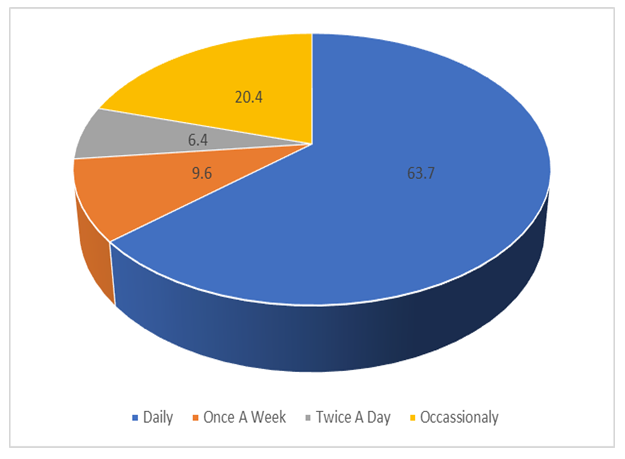 | Figure 1. Frequency of use of any type of dietary supplement(s) used by the dietary supplement users |
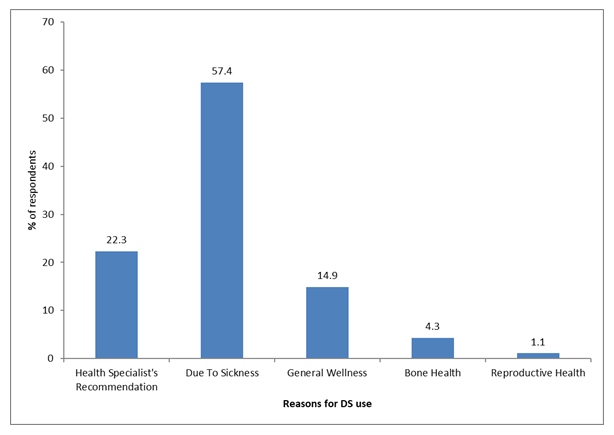 | Figure 2. Reasons for dietary supplements use |
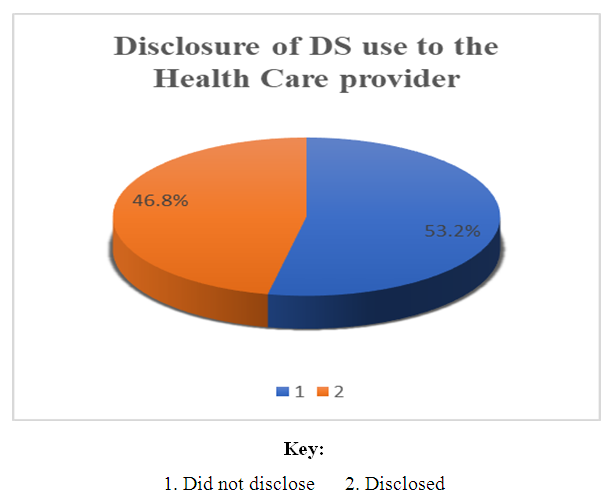 | Figure 3. DS users’ Disclosure to the healthcare provider |
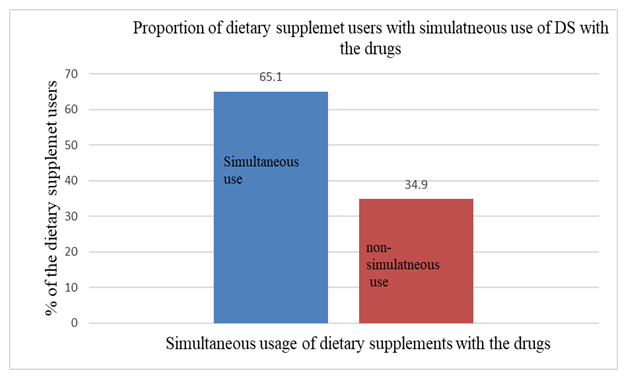 | Figure 4. Usage of dietary supplements in relation to prescribed medication |
4. Discussion
- Types of Dietary SupplementsA number of studies have reported the use of various types of dietary supplements by the dietary supplements users which included but not limited to the dietary supplements reported to be used by the dietary supplement users in this study. For instance, an earlier study had reported almost a consistent finding with the results of this study which had recorded that the use of calcium (single mineral), vitamin D, (single vitamin), multivitamin and vitamin C were common representing 31.1% 31.1%. 25.8% and 16.2% respectively among patients attending a periodontal outpatient clinic in Canada [11]. However, the most commonly used DS by adult outpatients with heart failure in Canada reportedly was multivitamins, calcium and/or vitamin D, fish oil, vitamin C, and vitamin E at 60%, 29%, 25%, 17% and 15% respectively [8]. This study reported more use of multivitamins which was the least used in the current study. Similar trend of rampant use of multivitamins was also seen among patients in another study too which reported that patients used antioxidants (51%), multivitamins (46%), vitamin D (25%), and milk thistle (23%) [12]. Reportedly, a significant proportion of respondents in this study had used unspecified supplements for varied reasons. The fact that these respondents were unable to accurately specify the type of supplements they were using was quite disturbing since there was a possibility of unsafe supplement substances use and abuse especially in illness. This posed a threat to their already compromised health status [12]. Frequency of Dietary Supplements useRegular use of dietary supplements has been on a rising trend in most studies. The users of dietary supplements had reported frequent use of DS with 70% reporting regular use and 20% reporting occasional use of the supplements in a previous study [13]. Additionally, almost 80% of older adults in the US had reported using their supplements on a daily basis and over 40% had also reported to have used them for over 4 months [14]. These earlier reports tallied with the findings of this study which reported that most users of dietary supplements took their supplements on a daily basis. This therefore is one of the evidence of rise of DS use even in this population too to actually tally with reported global rise of DS use.Reasons for using dietary supplementsThe use of dietary supplements is rampant world over and the users have cited several reasons for using them. For instance, a study reported that being generally sick from any condition would lead to the use of dietary supplements especially by older adults with stroke, cancer and arthritis and often used together with a prescribed or non-prescribed drug [15]. Additionally, up to 58% of the dietary supplements users had cited general wellness and health improvement as their main reasons for using deity supplements and up to 42% felt that they were deficient of some nutrients and actually took DS to supplement the deficiency [16] [17]. Other users have reported to have used dietary supplements to specifically manage dyslipidemia [18].Disclosure by the Adult outpatient DS users to the HCP about their use of Dietary supplements Earlier studies have documented that most of the DS users tended not to inform their healthcare providers about their use of dietary supplements [19]. Reportedly, about 70% of the admitted and ambulatory patients never reported the use of dietary supplements to the doctors in a study done in Japan [2]. In Thailand, even though the use of complementary medicines which includes dietary supplements use has been accepted in management of cancer, more than half (58%) of the DS users did not disclose their use to their healthcare provider [20]. Just as seen in the findings of this study, the level of DS users disclosure on the use of dietary supplements to the healthcare provider is still wanting and yet this would be a point of contact to help the patient use the supplements safely and for the health practitioner to take into consideration the supplements while giving prescription drugs to avoid any interactions.Concomitant Use of Dietary Supplements with Prescribed MedicationThere was notably high number of respondents who used dietary supplements and prescribed medication concomitantly representing 65.1% of the DS users. This proportion was almost double an earlier proportion of 36.8% of the outpatients who reported use of dietary supplements together with their medications in an earlier study [2]. This was a potential for drug-supplements interactions which could alter the pharmacokinetics of either the supplement, or the drug or both leading to inefficacy of either or both hence prolonging the time taken for the ailments to resolve and even impoverishing the prognosis.
5. Conclusions
- The use of dietary supplements is rampant with various patterns being linked to it. From this study most DS users used dietary supplements without necessarily knowing their importance in the body. They also tended not to disclose their use of dietary supplements to their healthcare provider even though most of them used the supplements regularly. Additionally there is high concomitant use of dietary supplements with drugs which may pose the risk of drugs-supplements interactions.
6. Recommendations
- There is an urgent need to create public awareness on various aspects of dietary supplements since it is appears that there exists an information gap even among the users themselves. Further, patient education on safe and relevant usage of dietary supplements is also essential in order to safeguard their already compromised health. There is also need to probe, as part of history taking by the healthcare providers, the use of dietary supplements by the patients in order to aid in the planning of appropriate care for these patients.
ACKNOWLEDGEMENTS
- We wish to acknowledge the respondents who voluntarily took part in this study and also the management of Kericho County Referral Hospital for granting permission and the support that we needed for the success of this study.
 Abstract
Abstract Reference
Reference Full-Text PDF
Full-Text PDF Full-text HTML
Full-text HTML